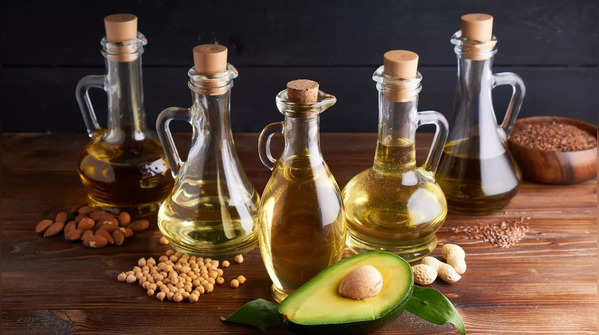7 cooking oils to avoid for better health; here’s what science says

Which cooking oils are bad for health?
Cooking oils are an integral part of daily meals. Be it frying, saute, or just for dressing a salad, oils are used in several recipes. No two oils are the same, and the misuse of some can really be too much of a blow to health if taken in large quantities. Cooking oils prepared with unhealthy fats that are linked with inflammation, weight gain, or chronic diseases exist in multitudes. But, do you know, there are several cooking oils that may look healthier, but can pose a serious health risk. Take a look at some of the 7 cooking oils that you should better be avoiding for optimal health.
(Images courtesy: Canva)

Vegetable Oil
Generally, vegetable oil is a kind of mix of a combination of soybean oil, corn, and sunflower oil. Though these are cheaper and widely used, they are highly refined, meaning all the natural nutrients inside them are removed. It introduces different chemicals that can be dangerous if consumed daily over time. Vegetable oils have been proved to contain very high levels of omega-6 fatty acids, which can cause inflammation associated with heart disease and other chronic disorders. However, these are essential fatty acids, and an imbalance between omega-6 and omega-3 will, most definitely, worsen inflammation.

Palm Oil
So much processed food is laden with palm oil. Palm oil is also an extensively used cooking oil in many parts of the world. Even though it is cheaper and multiuse, palm oil has been immensely criticized for its health and environmental concerns. Palm oil is rich in saturated fats, hence increasing the levels of LDL, or bad cholesterol, and increasing the chances of heart diseases. According to the American Journal of Clinical Nutrition, frequent intake of palm oil has been known to increase levels of cholesterol, thus risking one to be at a higher risk from cardiovascular disease. The study shows that replacement of palm oil with healthier fats reduces the risk for heart-related issues.

Canola Oil
Because it contained fewer saturated fats, canola oil was touted as healthy oil. However, most canola oil sold today is highly processed and genetically modified. The refining process for oil has to be subjected to high temperature, a step that introduces trans fats. Since an ingestive amount of trans fats is harmful, small amounts may exacerbate the risk of heart disease. In a study published in the Journal of Food Science, high-temperature processing of canola oil creates harmful by-products including aldehydes, which have been correlated with several health issues like cancer and neurodegenerative diseases .

Corn Oil
Corn oil contains a very high quantity of omega-6 fatty acids, just like vegetable oil. However, it can be easily used for frying and baking purposes, thereby upsetting the omega-6 and the omega-3 balance within the body. An imbalance between these two fatty acids promotes inflammation, and now inflammation is related to chronic diseases like diabetes, arthritis, and heart disease. A study from The American Journal of Clinical Nutrition suggests that those who consumed more omega-6s had greater indicators of inflammation than did those consuming higher amounts of omega-3s. This inequality is a hallmark of diets rich in fried and processed foods, which rely most heavily on corn oil.

Soybean Oil
Soybean oil is the other popular cooking oil found in packaged foods and restaurants. It is popularly advertised as a healthy oil due to its low saturated fat composition, but soybean oil is highly processed and rich in omega-6 fatty acid. Similar to corn oil, a high intake of omega-6 will result in a negative effect and leads to inflammation, among other health issues. In the journal Endocrinology, research has shown that the diets high in soybean oil are not only causing obesity but also had its impact on the liver. The study presents the possibilities that the increase in soybean oil consumption may relate to the growth cases of metabolic conditions such as diabetes, and liver with fatty infiltration.

Hydrogenated Oils
Hydrogenated oils are extensively used in margarine, shortening, and most processed foods. These oils were produced through changing their chemical composition for shelf life to last longer, thus resulting in harmful health effects. The hydrogenation process produced the trans fat that has been proved to increase LDL cholesterol and lessen HDL (good) cholesterol. The WHO has advised the complete removal of industrially-produced trans fats from the environment by 2023 due to their linkage with heart disease. Trans fats are among the worst kinds of fats and should be strictly avoided for healthy hearts.

Cottonseed Oil
Cottonseed oil is now commonly used in packaged snacks, margarine, and fast food for its neutral taste and low cost. However, cotton is not a food crop, meaning that cotton plants are typically sprayed with lethal pesticides, which then find their way into the oil commodity, potentially harmful to human health. In addition, cottonseed oil has a high amount of polyunsaturated fats that readily tend to become unstable at temperatures above certain levels. It oxidises quickly when heated. Oxidised oils can form free radicals that are harmful and have been associated with diseases including cancer and heart disease, among many others. Another study published in the journal Food Chemistry indicates that cooking has a significant chance of oxidative instability when referring to cottonseed oil .

Final words
Choosing the right cooking oil is a crucial step toward health for a long time. Though these seven oils are widely used, high amounts of unhealthy fats, chemical processing, and some environmental issues make these oils poor choices to make use of everyday. Extra virgin olive oil, avocado oil, and coconut oil are healthier options that have been scientifically proven to provide a multitude of health benefits. Right choices in the kitchen greatly reduce the risks for chronic diseases thereby improving overall health.









